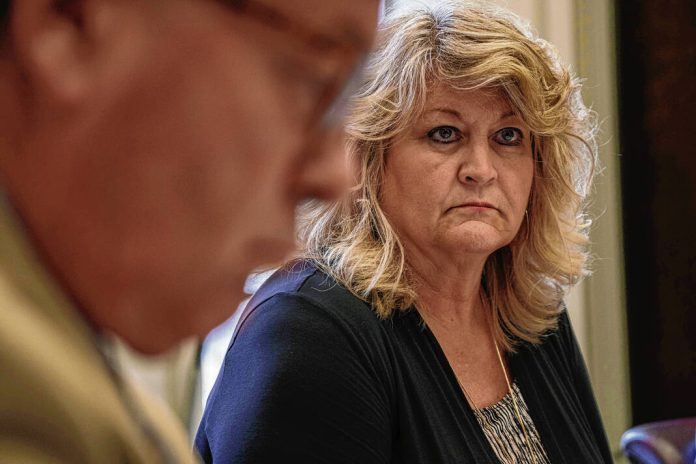
Mike Wolanin | The Republic Bartholomew County Election Board Secretary Shari Lentz listens to Bartholomew County Democratic Party Chairman Ross Thomas during a hearing challenging Republican Joseph Jay Foyst’s candidacy for Columbus City Council District 6 in the Bartholomew County Clerk’s Office at the Bartholomew County Courthouse in Columbus, Ind., Friday, Aug. 18, 2023. Thomas’ challenge asserted that the Bartholomew County Republican Party had not filed the paperwork for Foyst‘s candidacy on time. The board upheld the challenge and Foyst will be removed from the ballot.
County election officials plan to meet this week to consider pursuing legal counsel to represent them in a lawsuit challenging the candidacy of the Republican nominee for Columbus City Council District 6.
The Bartholomew County Election Board, whose members are named as defendants in the lawsuit, have scheduled a meeting for 3:30 p.m. Thursday to vote on whether they should retain legal counsel for the pending litigation.
The lawsuit, filed last week by Bartholomew County Democratic Party Chair Ross Thomas, is seeking court orders for Republican nominee Joseph Jay Foyst to be deemed ineligible for the Nov. 7 municipal election, and removed from the ballot.
Foyst as well as the members of the election board, are named as defendants in the lawsuit. The election board includes Bartholomew County Clerk Shari Lentz, James Holland and Mark Kevitt.
The pending legal fight over Foyst’s candidacy comes just over a month before early voting starts and could determine which party wins the District 6 seat. Should Thomas’ lawsuit prevail, Democratic nominee, Bryan Munoz, would run unopposed in the general election.
Thomas said he filed the lawsuit after Lentz refused to accept his second challenge to Foyst’s candidacy. He told The Republic that she had said the deadline had passed to file a challenge.
Foyst, 60, previously a salesman for 25 years and now a dump truck driver, was initially selected as the Bartholomew County Republican Party’s nominee during a party caucus in July. The caucus was convened after no Republican filed to run for the office in the party’s May primary, leaving a vacancy in the Nov. 7 general election.
Thomas filed his first challenge against Foyst on July 26, arguing that his candidacy was invalid because the Republican party had failed to file its notice for the July caucus with the clerk’s office by the required deadline.
While the election board upheld this challenge, there is a section of Indiana Code that allowed the GOP to fill the subsequent vacancy within 30 days, Lentz said in a previous interview.
The Bartholomew County Republican Party held another caucus for District 6 on Aug. 29, and Foyst was once again selected to fill the vacancy.
However, Thomas argues in his lawsuit that the section of Indiana Code in question would not refer to Foyst. He states in the lawsuit that he attempted to challenge Foyst’s latest filing through a formal complaint to the election, but Lentz refused to accept the challenge, meaning that he has “exhausted all administrative remedies.”
Thomas told The Republic that Lentz said that the deadline to file a challenge was Aug. 25. However, he asserted that this deadline was for filing challenges against candidates who were “rightfully on the ballot” by the original July deadline.
Thomas argues that Foyst was “was never a candidate under the law” because his paperwork was not filed on time.
The lawsuit was initially assigned to Bartholomew Circuit Court Judge Kelly Benjamin, who then recused herself from the case, citing a conflict of interest.
Benjamin said in a court order that the parties have until Thursday to agree on a special judge. If no agreement is reached, the Bartholomew County Clerk of Courts will appoint a special judge.
Assuming that “Clerk of Courts” is synonymous with Lentz’s position, that would mean that Lentz may have to appoint a special judge in a case in which she is a defendant.
As of Tuesday morning, there were no court filings that would indicate that the parties had settled on a special judge.




